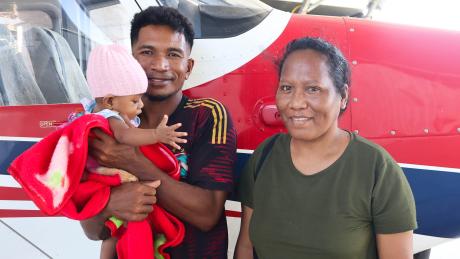
A 9-month-old baby boy who suffered from a severe fever was evacuated by an MAF plane and he and his family have returned home safely with joy.
Natacio Gusmão, a baby boy from Atauro Island, suffered from an intense fever and required emergency medical treatment for his condition.
He lives in Adara, a remote coastal village located on the western coast of the island of Atauro, where there is no road connecting it to the island’s main town, Vila Maumeta, on the eastern coast.
When he started feeling unwell, his parents had to take a local boat owned by the community to bring him to the main healthcare centre in Vila Maumeta, which took them two hours.
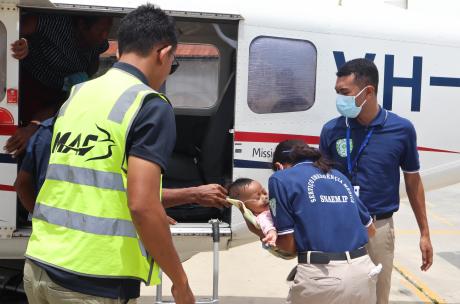
After they reached the healthcare centre, the nurses performed a check-up and identified that he had a wound in his throat and a high fever, which caused convulsions and abdominal distention, necessitating special treatment.
Upon receiving the medical test results, the nurses decided to transfer him to the National Hospital Guido Valadares (HNGV) in Dili by MAF plane, which was the only option that could provide a fast response to save him from his critical condition.
Abio Tilman, a 37-year-old father of Natacio and a basic schoolteacher and local fisherman in Adara, explained how the medevac saved his son’s life.
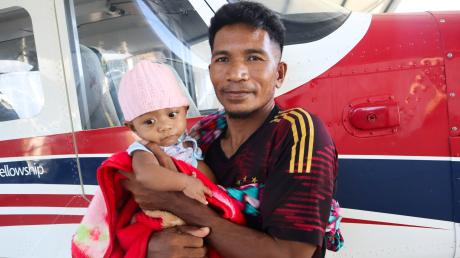
“The MAF flight was very helpful for us and saved my son’s life during this tough situation when there seemed to be no hope for us,” said Mr Tilman.
MAF flight was very helpful for us and saved my son’s life
“I'm thankful to MAF for providing us with a safe flight that helped us arrive in Dili quickly compared to traveling by boat, and it saved our son!”
Normally, traveling by boat to Dili could take 1 to 3 hours, but with an MAF flight, it could take less than 20 minutes.
Estela Noronha, MAF Closing the Loop Coordinator and Accounts Administrator, explained how she witnessed the patient’s condition when he arrived in Dili on the MAF plane VH-MQU on Friday, September 20th, 2024.
“I saw that his dad was worried, and carrying him in his arms, and the baby was in critical condition,” said Mrs Noronha.
“When they were about to step onto the ambulance, the baby suddenly pooped, and I thought he had a tummy problem.”
Estela expressed how she observed the patient’s condition improve during a hospital visit to follow up on the medevac patients at HNGV.
“When we went to the hospital, I expected that he was still enduring the same condition as before and would need more observation.”
“Surprisingly, the baby looked very good, and his father said that his tummy was getting better. I was very happy to see his condition improve.” Estela expressed.
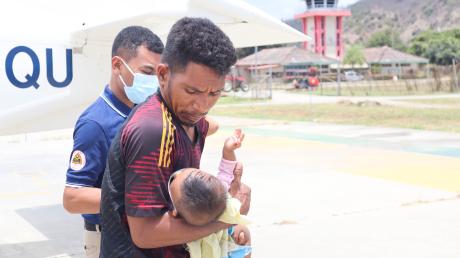
Mr. Tilman also expressed his gratitude for the extra gift of a care pack provided by the MAF team when they arrived in Dili.
“We received a bag provided by the MAF team as a special gift that contained essential items: baby clothes, food, drinking water, and sanitary supplies,” Mr Tilman said.
“I’m really grateful for the extra support provided by MAF, which helped us greatly during our stay in the hospital.”
Baby Natacio stayed in the hospital for almost a week, and he has now been discharged and is feeling better.
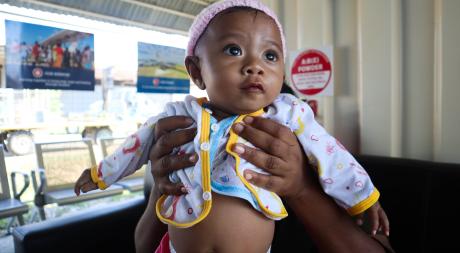
They returned to Adara on Friday, September 27, 2024, with an MAF plane, VH-MAH, which was piloted by Captain Ping Domtta.
Estela Noronha also conveyed her gratitude to the MAF donors who support the team running the program to help the people in Timor-Leste.
“Thank you so much for your kind support, and please continue your genuine support to help the people in Timor-Leste because it means a lot to them,” she added.